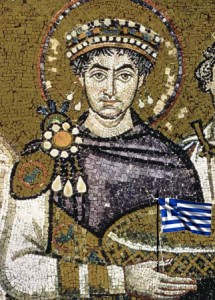Did the Byzantines consider themselves Greek?
 Rob points out that Edward Gibbon referred to the Byzantines as ‘Greeks’ and asks if they saw themselves as Greek.
Rob points out that Edward Gibbon referred to the Byzantines as ‘Greeks’ and asks if they saw themselves as Greek.
Belonging to Byzantium was never really a matter of blood. It was a ‘commonwealth’, a racially mixed group of what we would today call Slavs, Bulgarians, Serbs, Greeks, Thracians, etc. Greek wasn’t the only language spoken though it was by far the dominant one.
But they certainly didn’t see themselves as Greek- at least not as we use the word today. ‘Hellene’ had a pagan connotation- they called themselves Romanoi- which meant ‘Roman’ of course, but in a broader sense ‘civilized’. In other words, someone who had a classical education, dipped their bread in oil, and crossed themselves from right to left. National identities are very much a modern notion. Moving outward, most ancient and medieval people would have considered themselves belonging to a family, then a village or town, and then possibly a region. Beyond that there would probably be a dim view of ‘Christendom’, but certainly not a sense of being ‘a German’ or a ‘Spaniard. A ‘Byzantine’ would have divided the world into two basic parts- those who had civilization (Romans) and those who didn’t (barbarians). It was not necessarily a haughty thing- the Persians were viewed as refined, worthy adversaries. But they were not ‘right-thinking’- in other words they didn’t acknowledge the true emperor (ruler of the civilized world) or the true religion (Orthodoxy). They were therefore ‘barbarians’ no matter how impressive their society was.
The Persians are still not with it and never will be unless they get rid of their Islamic Republic and get a secular government.
I find it fascinating that ‘nationalism’ is a relatively modern concept – especially since WWII, when many nations were created out of old empires. The ancients seemed to see things from a very ‘them and us’ perspective: Jews and Gentiles, Greeks and Barbarians.
The common view is that ancients were intolerant, racist, exclusionary; I get the feeling if that was the case, they were no more than we – as you’ve pointed out, at least the demonym (?) Romanoi included anyone ‘civilised’. To an extent, that’s quite an embracing term.
The Persians (Iranians) did have a secular government back in the 1970’s that was backed by the US and supported by many western countries. Research on the Shah of Iran – he was the secular leader of Iran. He was overthrown by a massive revolution by millions of people on the streets of Iran who favoured the so-called Islamic government in Iran at the moment.
Interestingly though, Iran has the fastest growing economy in the Middle east at the moment. That happens because they are willing to follow their own policies instead of taking orders from the american government- which the Shah of Iran used to do.
Regards
Well,actually they related to Greek more than Roman culture. Even the laws in Justinian’s Code had some Greek Eastern influence on donations and dowies being equal. I believe the historian JD Bury mentions this. Granted, the Romanoi name was use but few Byzantines were interested in Livy, or Cicero so forth even in Greek Translation. The Classical Roman Upper Class knew both Greek and Latin while the Greek East never thought it was important. Robert Browning states that in the middle period Greek Literature and Philosophy became of interested after the so-called dark age period around 850 or later. And I remember in his book about the Byzantines, one Byzantine admiring Plutarch who was not admired in the west during the middle ages but both ancient Greeks and Romans did admire him. And in Italy the Byzantines control the Greek Culture cities in the south much longer than the Latin ones in Central Italy or the Germanic ones in the North like those inhabited by the Lombard or Franks or so forth. Much more a culture formed by Greece with Roman government than a Roman Culture. The byzantines in the middle ages became less and less Roman or Greek in the ancient sense and more medieval just like the Western Europeans in Italy after the Byzantine-Goth War became less Western Roman in the old sense. After the Byzantine-Goth War Rome no longer had a senate hence the end of the Western Roman not in 476 like most historians use but probably 555 or so forth.
“Belonging to Byzantium was never really a matter of blood.”
Funny, you have forgotten exactly the most important part: Romania and Romanians. The only Latin-speaking people which are Orthodox. And even the Otomans considered them as part of Roman Empire, which they have conquered.
Is true, the first “Romania” was actually much closer to Constantinopolis. And “Romanoi” were all the greeks until 1800.
[…] including a history blog, where readers could ask him questions. I even submitted my own curious question to Lars and was pleasantly surprised that he would feature it on his […]